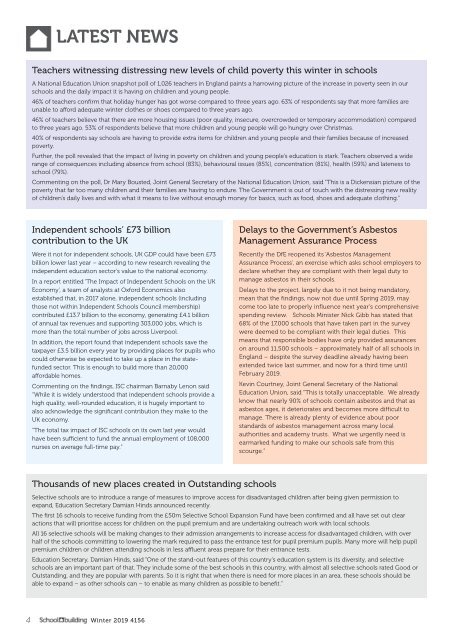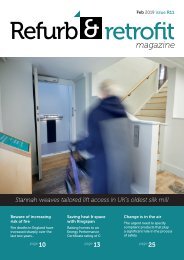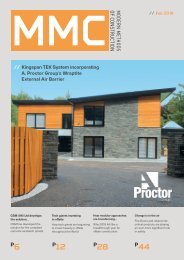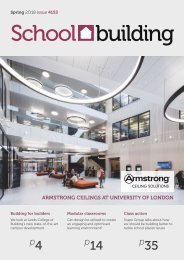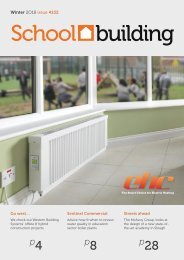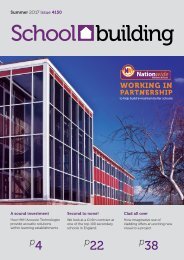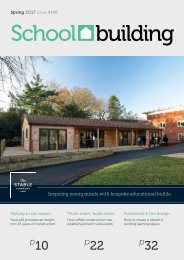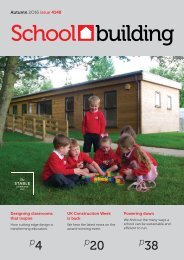SB 4156 32pp WEB
You also want an ePaper? Increase the reach of your titles
YUMPU automatically turns print PDFs into web optimized ePapers that Google loves.
LATEST NEWS<br />
Teachers witnessing distressing new levels of child poverty this winter in schools<br />
A National Education Union snapshot poll of 1,026 teachers in England paints a harrowing picture of the increase in poverty seen in our<br />
schools and the daily impact it is having on children and young people.<br />
46% of teachers confirm that holiday hunger has got worse compared to three years ago. 63% of respondents say that more families are<br />
unable to afford adequate winter clothes or shoes compared to three years ago.<br />
46% of teachers believe that there are more housing issues (poor quality, insecure, overcrowded or temporary accommodation) compared<br />
to three years ago. 53% of respondents believe that more children and young people will go hungry over Christmas.<br />
40% of respondents say schools are having to provide extra items for children and young people and their families because of increased<br />
poverty.<br />
Further, the poll revealed that the impact of living in poverty on children and young people’s education is stark. Teachers observed a wide<br />
range of consequences including absence from school (83%), behavioural issues (85%), concentration (81%), health (59%) and lateness to<br />
school (79%).<br />
Commenting on the poll, Dr Mary Bousted, Joint General Secretary of the National Education Union, said “This is a Dickensian picture of the<br />
poverty that far too many children and their families are having to endure. The Government is out of touch with the distressing new reality<br />
of children’s daily lives and with what it means to live without enough money for basics, such as food, shoes and adequate clothing.”<br />
Independent schools’ £73 billion<br />
contribution to the UK<br />
Were it not for independent schools, UK GDP could have been £73<br />
billion lower last year – according to new research revealing the<br />
independent education sector’s value to the national economy.<br />
In a report entitled ‘The Impact of Independent Schools on the UK<br />
Economy’, a team of analysts at Oxford Economics also<br />
established that, in 2017 alone, independent schools (including<br />
those not within Independent Schools Council membership)<br />
contributed £13.7 billion to the economy, generating £4.1 billion<br />
of annual tax revenues and supporting 303,000 jobs, which is<br />
more than the total number of jobs across Liverpool.<br />
In addition, the report found that independent schools save the<br />
taxpayer £3.5 billion every year by providing places for pupils who<br />
could otherwise be expected to take up a place in the statefunded<br />
sector. This is enough to build more than 20,000<br />
affordable homes.<br />
Commenting on the findings, ISC chairman Barnaby Lenon said<br />
“While it is widely understood that independent schools provide a<br />
high quality, well-rounded education, it is hugely important to<br />
also acknowledge the significant contribution they make to the<br />
UK economy.<br />
“The total tax impact of ISC schools on its own last year would<br />
have been sufficient to fund the annual employment of 108,000<br />
nurses on average full-time pay.”<br />
Delays to the Government’s Asbestos<br />
Management Assurance Process<br />
Recently the DfE reopened its ‘Asbestos Management<br />
Assurance Process’, an exercise which asks school employers to<br />
declare whether they are compliant with their legal duty to<br />
manage asbestos in their schools.<br />
Delays to the project, largely due to it not being mandatory,<br />
mean that the findings, now not due until Spring 2019, may<br />
come too late to properly influence next year’s comprehensive<br />
spending review. Schools Minister Nick Gibb has stated that<br />
68% of the 17,000 schools that have taken part in the survey<br />
were deemed to be compliant with their legal duties. This<br />
means that responsible bodies have only provided assurances<br />
on around 11,500 schools – approximately half of all schools in<br />
England – despite the survey deadline already having been<br />
extended twice last summer, and now for a third time until<br />
February 2019.<br />
Kevin Courtney, Joint General Secretary of the National<br />
Education Union, said “This is totally unacceptable. We already<br />
know that nearly 90% of schools contain asbestos and that as<br />
asbestos ages, it deteriorates and becomes more difficult to<br />
manage. There is already plenty of evidence about poor<br />
standards of asbestos management across many local<br />
authorities and academy trusts. What we urgently need is<br />
earmarked funding to make our schools safe from this<br />
scourge.”<br />
Thousands of new places created in Outstanding schools<br />
Selective schools are to introduce a range of measures to improve access for disadvantaged children after being given permission to<br />
expand, Education Secretary Damian Hinds announced recently.<br />
The first 16 schools to receive funding from the £50m Selective School Expansion Fund have been confirmed and all have set out clear<br />
actions that will prioritise access for children on the pupil premium and are undertaking outreach work with local schools.<br />
All 16 selective schools will be making changes to their admission arrangements to increase access for disadvantaged children, with over<br />
half of the schools committing to lowering the mark required to pass the entrance test for pupil premium pupils. Many more will help pupil<br />
premium children or children attending schools in less affluent areas prepare for their entrance tests.<br />
Education Secretary, Damian Hinds, said “One of the stand-out features of this country’s education system is its diversity, and selective<br />
schools are an important part of that. They include some of the best schools in this country, with almost all selective schools rated Good or<br />
Outstanding, and they are popular with parents. So it is right that when there is need for more places in an area, these schools should be<br />
able to expand – as other schools can – to enable as many children as possible to benefit.”<br />
4<br />
Winter 2019 <strong>4156</strong>


